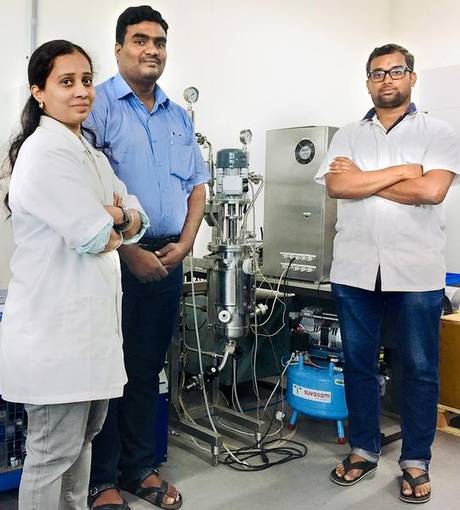
(Left) Research scholars Kruthi Doriya and Anup Ashok with chemical engineering associate professor Devarai Santhosh Kumar (centre) at Industrial Bioprocess and Bio-Prospecting lab at IIT-H; (above) civil engineering associate professor Asif Qureshi.
IIT-H team finds Antarctic fungi that may help treat Acute Lymphoblastic Leukemia
Researchers at the Indian Institute of Technology-Hyderabad (IIT-H) working with scientists from National Centre for Polar and Ocean Research (NCPOR), Goa, have isolated Antarctic fungi that contain ‘L-Asparaginase’, an enzyme-based chemotherapeutic agent used to treat Acute Lymphoblastic Leukemia (ALL).
Fewer side-effects
ALL is the most common type of childhood cancer and isolation of L-Asparaginase’ containing fungi from extreme environments could lead to development of new chemotherapeutic treatment methods that have fewer side-effects than the existing methods.
In ALL, the bone marrow produces an excess of immature lymphocytes, a form of white blood cells.
One of the most frequently used chemotherapy drugs to treat ALL is the enzyme ‘L- Asparaginase’ which reduces the supply of asparagine, an amino acid that is essential for the synthesis of protein, to cancer cells. This prevents the growth and proliferation of the malignant cells.
The path-breaking work has recently been published in Nature’s Open Source Journal, Scientific Reports (https://www.nature.com/articles/s41598-018-38094-1). IIT-H team consisted of Devarai Santhosh Kumar, associate professor, department of chemical engineering, and Asif Qureshi, associate professor, department of civil engineering, along with their research students Anup Ashok, Kruthi Doriya and Jyothi Vithal Rao while NCPOR team included Dr. Anoop Kumar Tiwari.
Drug costs
Principal investigator Dr. Santhosh Kumar said, “Extensive purification steps are necessary before L-Asparaginase derived from E. Coli and E. Chrysanthemi is used as a drug to treat ALL. This increases cost of the drug.”
‘L-Asparaginase’ enzyme used for chemotherapy is currently derived from commonly found bacteria such as Escherichia coli and Erwinia chrysanthemi. These enzymes are always associated with two other enzymes, glutaminase and urease, both of which cause adverse side effects in patients such as pancreatitis, hemostasis abnormalities, central nervous system dysfunction and immunological reactions.
The research team looked at psychrophiles as alternate sources of the enzyme. Psychrophiles are organisms capable of growth and reproduction in low temperatures in the range of −20 °C to +10 °C, such as those found in Antarctic regions.
These organisms have modified life processes that help them adapt to the extreme conditions of living. For example, psychrophiles have ‘anti-freeze’ enzymes that are powerful enough to be able to work at the freezing temperatures of the poles, unlike mesophiles that live in more habitable zones of the earth. The potency of the enzymes makes them promising as powerful drugs for diseases such as cancer, he said.
55 samples collected
Industrial bioprocess and bioprospecting laboratory research team, seeking alternate sources of L-Asparaginase, screened and isolated fungi collected from the soil and mosses in Schirmacher Hills, Dronning Maud Land, Antarctica. These fungi were found to have L-Asparaginase free of glutaminase and urease. The team isolated 55 samples of fungi, of which 30 isolates had pure L-Asparaginase.
Absence of glutaminase and urease would prevent the serious side-effects currently seen with the use of bacteria-derived L-Asparaginase. “Fungal species have the ability to mimic the properties of human cells, as both are eukaryotic in nature, which makes it easier for their usage in treatment of ALL,” the researchers wrote in their Nature Scientific Reports paper.
source: http://www.thehindu.com / The Hindu / Home> News> Cities > Hyderabad / by Special Correspondent / Hyderabad – February 20th, 2019







